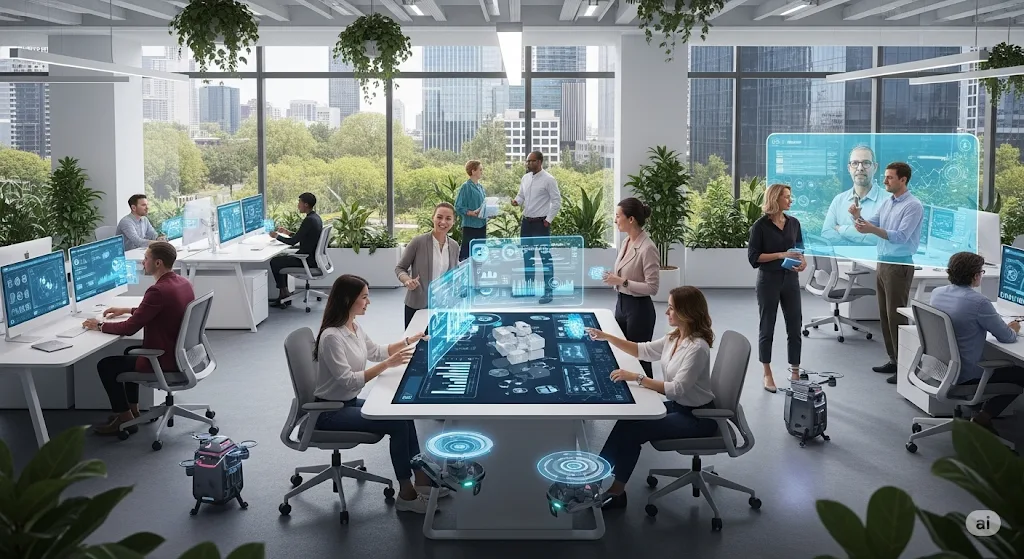
As artificial intelligence continues to evolve at pace, concerns about the future of work are growing. From self-checkout tills to AI chatbots and predictive algorithms, automation is already reshaping how businesses operate — and the changes are only accelerating.
But will AI actually replace your job? Or is it more likely to change the nature of your work rather than eliminate it altogether? In the UK and beyond, this question is becoming central to career planning, business strategy, and national policy. In this article, we explore what AI can do, where it’s already being used, and what the future may hold for British workers.
What AI Can Already Do — And What It Can’t
AI has made significant progress in recent years, particularly in natural language processing, data analysis and task automation. Modern AI systems can draft emails, summarise legal documents, detect fraud, generate artwork and even respond to customer service queries. In many cases, these tools are faster, cheaper and more consistent than human workers.
However, AI still struggles with tasks that require emotional intelligence, ethical judgment, physical dexterity or complex human interaction. Jobs involving nuanced communication, creative strategy, or real-time problem-solving are still far beyond what current systems can manage reliably.
In short, AI can replace specific tasks, but not necessarily entire roles — at least not yet.
Which Jobs Are Most at Risk?
Not all occupations face the same level of disruption. Roles that involve repetitive, rules-based tasks are more vulnerable to automation. In the UK, studies from the Office for National Statistics (ONS) and PwC have suggested that up to 30% of jobs could be affected by automation in the next two decades.
Sectors most at risk include:
- Retail and customer service, particularly roles involving simple enquiries or transactions.
- Transportation and warehousing, with self-driving vehicles and smart logistics.
- Administrative roles, such as data entry, scheduling, and document management.
- Finance and accounting, especially entry-level roles focused on processing data.
That said, AI is also creating demand for new roles — particularly in tech, ethics, data science and human–machine collaboration. Jobs requiring empathy, adaptability and critical thinking are likely to be more resilient.
How the UK Labour Market Is Adapting
Government, industry and education providers in the UK are already preparing for an AI-driven future. Initiatives such as the UK National AI Strategy and Lifelong Learning Entitlement aim to equip workers with the skills needed to thrive in changing industries.
We’re also seeing a shift in employer expectations. Many job postings now include requirements such as “experience working with automation tools” or “familiarity with AI-powered platforms.” The ability to work alongside technology — rather than be replaced by it — is becoming a valuable skill in its own right.
At the same time, hybrid working models and remote collaboration tools are reshaping what productivity looks like, with AI increasingly embedded into everyday platforms like Microsoft 365, Zoom and Slack.
What You Can Do to Future-Proof Your Career
While no one can predict the future with certainty, there are proactive steps you can take now to stay relevant and adaptable in a changing job market.
1. Focus on Human-Centric Skills
Creativity, empathy, communication, and leadership remain difficult to automate. Workers who excel in these areas are likely to remain in demand, regardless of how advanced AI becomes.
2. Embrace Lifelong Learning
Upskilling is no longer optional. Whether it’s coding, digital marketing, data visualisation or prompt engineering, adding new skills to your toolkit increases your value. Free and low-cost courses are available through platforms like FutureLearn, OpenLearn and Coursera — many with UK-accredited certifications.
3. Understand How AI Applies to Your Industry
AI is not one-size-fits-all. Learn how it’s being used in your field, what tools are emerging, and how they might change your day-to-day work. If you’re in marketing, for example, explore how AI supports campaign analytics or content generation. If you’re in law, look into AI-assisted contract review tools.
4. Think About Complementary Roles
Rather than fearing replacement, consider how your role could evolve to work with AI. For instance, customer service agents may shift from answering routine questions to handling complex or emotional cases, with AI taking care of FAQs and scheduling.
Will AI Replace Jobs — or Just Change Them?
In most industries, AI is more likely to transform roles than eliminate them outright. Think of it as similar to past industrial shifts: machinery didn’t wipe out agriculture or manufacturing — it changed how those sectors operated and created new kinds of work.
According to Deloitte and the World Economic Forum, many AI-related job losses are expected to be offset by job creation in AI development, cybersecurity, data management, ethical oversight, and digital infrastructure.
The challenge for both workers and employers is not to stop automation, but to manage it responsibly and prepare for the transitions ahead.
Ethical and Economic Considerations
AI’s impact on the job market isn’t just technical — it’s also ethical. Who benefits most from automation? How should displaced workers be supported? Should AI systems be required to explain their decisions, especially when used in hiring or performance evaluations?
These questions are shaping public debate, with the UK Information Commissioner’s Office (ICO) and regulators in the EU working to develop transparency and fairness guidelines.
As AI adoption grows, expect more emphasis on responsible implementation, with policies to ensure that technological progress doesn’t widen inequality or erode worker rights.
Adaptability Is the New Job Security
The future of work in the age of AI will reward those who stay curious, flexible and forward-thinking. While certain roles may disappear, many others will evolve — and entirely new careers will emerge that don’t exist yet.Instead of asking, “Will AI replace my job?”, the better question is: “How can I work alongside AI and remain valuable in a changing world?” If you focus on skills that AI can’t replicate, keep learning, and embrace new tools as they emerge, you’ll be well-positioned — no matter where the future leads.

 How to Make $1,000 a Month: Achieve Passive Income Now
How to Make $1,000 a Month: Achieve Passive Income Now  The Psychology Behind Stock Market Trends: Unveiling Insights
The Psychology Behind Stock Market Trends: Unveiling Insights  How to Build an Investment Portfolio with $10,000: Start Now!
How to Build an Investment Portfolio with $10,000: Start Now!